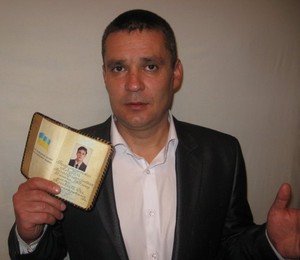
Psychiatric Abuse For Political Purposes Returns to Ukraine
Publication: Eurasia Daily Monitor Volume: 8 Issue: 159
By:

The Soviet abuse of psychiatry for political purposes isolated thousands of political and religious prisoners in psychiatric hospitals. Some of these practices continued in post-Soviet countries such as Russia and Uzbekistan, but have only been reported in Ukraine since 2010 – the year in which Viktor Yanukovych was elected president.
In June 2010, only five months after Yanukovych was elected, the Ministry of Interior (MVS) Human Rights Monitoring Department, established in 2008 with a mandate to hold the police accountable for its actions, was closed. Two months later the MVS disbanded its hate crimes investigations unit. The headline “The Gangster Era Has Already Returned” summed up the prevalent view that law enforcement officers are no longer even partially accountable for their actions (Komentari, July 22).
Uzbekistan has taken the lead in the former Soviet Union in sentencing oppositionists for speaking out. In 2005, following the actions by the security forces in Andijan, Holly Carter, Europe and Central Asia Director at Human Rights Watch, said “This is an insidious attempt to equate criticism of the government with insanity” (www.hrw.org).
Psychiatric abuse for political purposes in the USSR was brought to the attention of the democratic world in 1971, when the Russian dissident Vladimir Bukovsky smuggled into the West a 150-page file documenting political abuse of psychiatry. The documents were discussed in The Times as well as the British Journal of Psychiatry and became an ongoing subject of rancorous debate in the World Psychiatric Association (WPA) over the next two decades. At the WPA Mexico Congress in November 1971 the Soviet delegation walked out.
The following four cases constitute the first Western analysis of the return of psychiatric abuse for political purposes in Ukraine. The first is that of Andrei Fedosov, the Chairman of an NGO in the Crimea that defends the rights of disabled people (www.amnesty.org). In an October 2010 press release the international human rights organization, Amnesty International, described Fedosov’s work as including the monitoring of psychiatric hospitals. This research detailed allegations of unlawful confinement in psychiatric institutions, as well as torture and ill-treatment of patients in three such institutions (www.amnesty.org, October 2010). Fedosov was assaulted by unknown thugs in May 2010 and two months later detained for a crime he allegedly committed a decade ago when he was 15 years old. He fears for his safety and possible trumped up charges.
The second case is that of Andrei Bondarenko who in October 2010 was ordered to undergo a forced psychiatric examination by a court in Vynntsia. Bondarenko had earlier undertaken three psychiatric examinations to prove his sanity. Echoing the Soviet and Uzbek cases above, the official Ukrainian justification for the attempt to incarcerate Bondarenko in a psychiatric hospital is his “excessive awareness of his own and others’ rights and his uncontrollable readiness to defend these rights in unrealistic ways” (www.amnesty.org, November 3, 2010). Heather McGill, Amnesty International’s expert on Ukraine, said “There is a very real concern that Andrei Bondarenko will be subjected to a forced psychiatric examination because of his legitimate trade union and human rights activities” (www.amnesty.org, November 4, 2010). Bondarenko has been an independent trade union activist since 2006 and in 2009 he was elected deputy head of the local branch of the independent trade union “Laborers” (Trudiashchi). His campaigns have threatened the vested interests of local businessmen and officials, particularly in the sugar industry.
A third case is that of Rostyslav Chapran, arrested by the police in April on trumped-up charges demanding that his family must pay a ransom of 3,000 Euros ($4,322) to have him released. As in other similar cases, Chapran was first given a 15 day sentence under the catch-all charge of “hooliganism” and upon its completion he was charged with an attempted murder allegedly committed in 1999 (https://helsinki.org.ua, June 1).
Chapran’s original detention was in violation of article 5 of the European Convention of Human Rights. The purpose of the article is to ensure that the police can produce evidence for the charge, which, as Amnesty International points out, is often obtained in Ukraine through torture or other ill-treatment (www.amnesty.org, June 16).
On April 22, Chapran was transferred to a psychiatric hospital where he was incarcerated until May 26. During his incarceration he was held incommunicado with his family not knowing where was he was being detained. As Amnesty International highlighted in an “Urgent Action” press release, “It is normal practice in Ukraine for suspects accused of serious crimes to be sent for psychiatric evaluation as an inpatient in a closed ward of a psychiatric hospital…” (www.amnesty.org, June 16).
A fourth case is that of Kostiantyn Lavrov, head of the Civic Force NGO who was ordered to undergo a psychiatric examination in Donetsk after organizing public protests against construction by the MAKO Company, whose president is Oleksandr Yanukovych, a Party of Regions deputy and the eldest son of President Yanukovych. On May 15, MAKO began demolishing the Soviet era Hotel Druzhba to replace it with an apartment complex. Local residents appealed to the courts to annul the April 15 decision by the Donetsk city council to transfer the land under Hotel Druzhba for 49 years to MAKO (Ukrayinska Pravda, July 14, Ostrov, June 21). On June 9, local thugs in typical sports attire who presumably had been hired by MAKO physically attacked the protestors (Ukrayinska Pravda, June 21).
On June 20, Lavrov was arrested on trumped-up charges of demanding a bribe of $7,000 from MAKO to halt the protests and nine days later he was ordered to undergo a psychiatric examination. His lawyer responded: “I believe there is no basis whatsoever for such a court decision” (Ukrayinska Pravda, July 14).
The use of false charges to incriminate civil society activists is growing. Two environmental activists arrested in Kharkiv, who organized protests against tree felling, are considered by Amnesty International to be “prisoners of conscience” (www.amnesty.org, June 18). As in the above and other cases, thugs in sports outfits attacked the protestors while the police looked on. Criminal charges against nine leaders of the anti-tax code protests for “damaging” floor tiles on Independence Square after erecting tents are another example of trumped-up charges (https://helsinki.org.ua, January 18). In the spring of 2007, Party of Regions activists put up similar tents on the square in protest against President Viktor Yushchenko’s decree dissolving parliament.
Intimidation of civil society activists is a deliberate tactic to subdue Ukrainian society and forestall potential protests or a second Orange Revolution. These tactics, reminiscent of other authoritarian regimes in Eurasia, are inconsistent with European values that Ukrainian officials repeatedly claim allegiance to. A return to political abuse of psychiatry is certainly more reminiscent of the Soviet Union than the EU.




